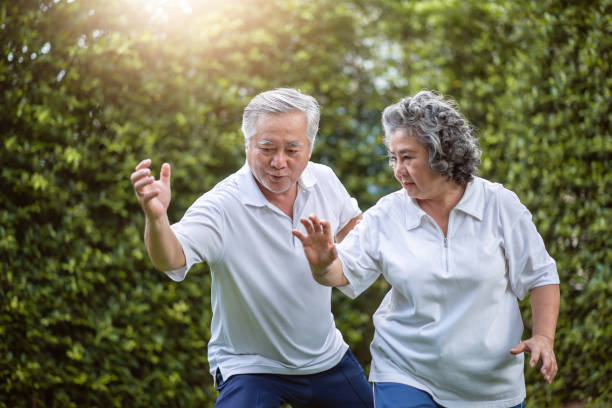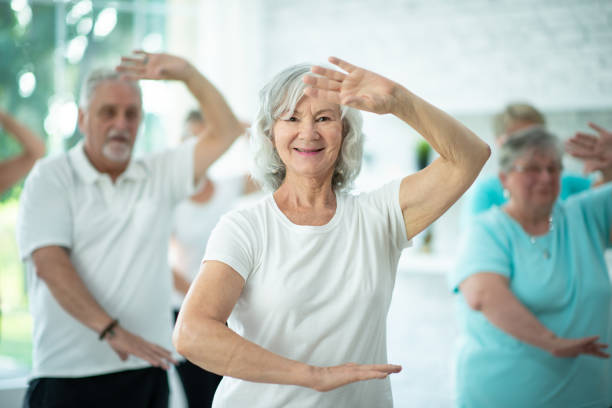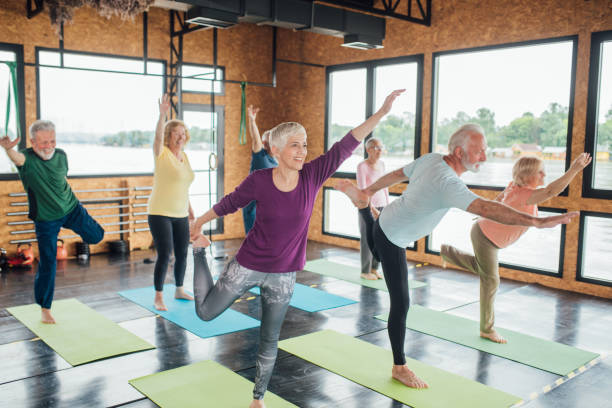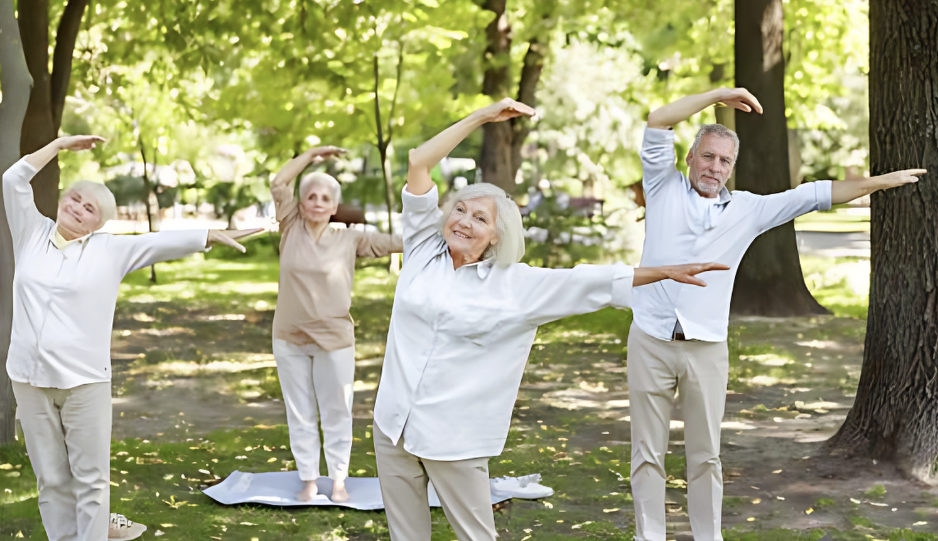Body movement Therapy
Is Tai Chi the Secret Technique for Flexibility in Seniors?
Are you a senior looking to increase your flexibility? Look no farther than Tai Chi. This ancient Chinese martial art has been shown to be extremely beneficial for enhancing flexibility in older persons. Studies have shown that regular tai chi practice can dramatically enhance range of motion and joint flexibility for seniors.
Tai chi blends slow, flowing movements with deep breathing and relaxation techniques, making it a safe and gentle exercise alternative for the elderly. Unlike other kinds of exercise, tai chi does not put strain on the joints, making it perfect for people with arthritis or other joint issues.
Tai chi not only improves flexibility, but it also provides several health benefits to seniors. It can enhance balance, minimize falls, and aid with the symptoms of chronic illnesses like high blood pressure, heart disease, and osteoporosis.
So, if you want to increase your flexibility and overall health, try tai chi. Find a local class or use online lessons to begin your road to increased strength, flexibility, and well-being.
Understanding the Importance of Flexibility in Seniors
Flexibility is an important part of maintaining physical health, particularly for seniors. As we age, our muscles and joints naturally stiffen and lose flexibility. This can cause a variety of problems, including less mobility, an increased chance of falling, and a lower overall quality of life. Seniors must therefore favor flexible activities.
Good flexibility enables seniors to accomplish daily duties more easily and decreases the chance of injury. Simple tasks, such as reaching for products on high shelves or bending down to tie shoelaces, can become difficult if flexibility is reduced. Seniors who improve their flexibility can keep their independence and continue to participate in activities they like.

The Connection Between Tai Chi and Flexibility
Tai chi has long been known for its capacity to increase flexibility, among other health benefits. This traditional Chinese practice incorporates gentle, flowing movements, deep breathing, and mindfulness. Tai chi and its gentle and controlled nature allows seniors to gently stretch their muscles and joints, increasing flexibility while avoiding tension or discomfort.
Tai chi movements are meant to target all major muscle groups and joints, providing a total-body workout that increases flexibility throughout the body. Slow and purposeful exercises can help elders develop their range of motion and joint flexibility over time.
Research and Studies on Tai Chi’s Impact
Numerous research have been undertaken to study the effects of tai chi on flexibility in the elderly. A study published in the Journal of Aging and Physical Activity discovered that regular tai chi practice dramatically improved flexibility in older persons. Participants who practiced tai chi demonstrated greater joint flexibility and range of motion than those who did not exercise regularly.
Another study published in the Journal of Aging and Health looked at the impact of a 12-week tai chi program on flexibility in seniors with osteoarthritis. The findings revealed that people who practiced tai chi had significantly improved joint flexibility and reported less pain and stiffness in their joints.
These studies, along with many others, give compelling evidence that tai chi is useful in improving flexibility in seniors. Tai chi’s slow and gentle movements allow for progressive and safe increases in flexibility, making it an excellent exercise choice for older folks.
How Tai Chi Improves Flexibility
Tai chi increases flexibility by combining stretching, strengthening, and relaxation practices. Also Tai chi’s slow and controlled movements allow for gradual and gentle stretching of the muscles and joints, resulting in increasing flexibility over time.
Tai chi’s deep breathing and relaxation techniques help to improve flexibility. Seniors can reduce muscle tension and increase their range of motion by focusing on deep, diaphragmatic breathing and consciously relaxing the body.
Furthermore, the weight-shifting and balance movements in tai chi strengthen the muscles that surround the joints, providing stability and support. As muscles strengthen, they become more capable of moving and stretching, resulting in enhanced flexibility.

Specific Tai Chi Exercises for Improving Flexibility in Seniors
Tai chi is a set of motions and postures that may be tailored to target specific parts of the body for increased flexibility. Below are some specific tai chi movements that can assist elders improve their flexibility:
- Arm Circles: Stand with your feet shoulder-width apart, arms out to the sides. Slowly move your arms forward in broad, controlled circles. Repeat numerous times, and then reverse the direction of the circles.
- Leg Swings: For added support, stand next to a wall or chair. Swing one leg forth and backward in a controlled motion, concentrating on the range of motion in the hip joint. Repeat for the opposite leg.
- Spine Twists: Stand with your feet shoulder-width apart, arms extended in front of you. Slowly shift your torso to one side while keeping your hips pointed forward. Return to the center, then twist to the opposite side.
- Shoulder Rolls: Stand with your feet shoulder-width apart, arms at your sides. Begin moving your shoulders forward in a circular motion, gradually increasing the size of each circle. Reverse the direction of the shoulder roll.
These exercises can be incorporated into a regular tai chi practice or performed as standalone exercises to target specific areas of the body for improved flexibility. Remember to perform the movements slowly and with control, focusing on the stretch and range of motion.
Tips for Seniors Starting Tai Chi for Flexibility
If you’re a senior looking to start tai chi for improved flexibility, here are some tips to help you get started:
- Consult with your healthcare provider: Before beginning any new fitness regimen, you should contact with your healthcare practitioner, especially if you have any pre-existing conditions or concerns.
- Begin slowly: Tai chi is a practice that requires patience and perseverance. Begin with shorter sessions and work your way up to longer and more intense ones as you gain flexibility.
- Find a competent instructor: Look for a tai chi instructor that has prior experience working with seniors and understands the unique needs and limits of older persons.
- Practice regularly: Regular practice is essential for improving flexibility. To achieve the best benefits, practice tai chi at least a couple times per week.
- Listen to your body: Pay attention to how your body feels during and after doing tai chi. If you are experiencing pain or discomfort, alter your motions or seek advice from your teacher.
By following these tips and committing to regular practice, seniors can experience significant improvements in flexibility through the practice of tai chi.

Other Benefits of Tai Chi for Seniors
In addition to improved flexibility, tai chi offers numerous other health benefits for seniors. Some of the notable benefits include:
- Balance improvement: Tai chi exercises focus on weight-shifting and controlled movements, which can improve balance and reduce the risk of falls in seniors.
- Stress reduction: Tai chi incorporates deep breathing and relaxation techniques, which can help seniors manage stress and promote overall mental well-being.
- Pain relief: Regular tai chi practice has been shown to alleviate symptoms of chronic pain conditions such as arthritis and fibromyalgia.
- Cardiovascular health: The gentle aerobic nature of tai chi can improve heart health and reduce the risk of cardiovascular diseases.
- Improved cognitive function: Some studies suggest that tai chi may have cognitive benefits, such as improved memory and attention, in seniors.
These additional benefits make tai chi a well-rounded exercise option for seniors, promoting not only physical health but also mental and emotional well-being.
Tai Chi Classes and Resources for Seniors
If you’re interested in starting tai chi for improved flexibility, there are several options available for seniors:
- Local community centers: Many community centers provide tai chi lessons for elders. These classes are generally inexpensive and offer the opportunity to learn from skilled instructors.
- Senior centers: Senior centers frequently conduct tai chi sessions geared toward the needs and abilities of older persons. These classes may be available at a reduced cost or even free of charge.
- Online tutorials: There are several online tools and tutorials available to help elders practice tai chi from the comfort of their own homes. Websites and video platforms, such as YouTube, provide a variety of tai chi tutorials for all skill levels.
- Tai chi DVDs: If you prefer a more structured approach, you may buy or rent tai chi DVDs geared at seniors from a variety of vendors.
Whether you choose to join a class or practice at home, the key is to find a method that suits your needs and preferences. Tai chi is a versatile practice that can be adapted to different environments and circumstances.
Conclusion
To summarize, tai chi is an excellent workout alternative for seniors wishing to increase their flexibility. Slow and gentle exercises, combined with deep breathing and relaxation techniques, help to develop range of motion and joint flexibility. Regular tai chi practice can also enhance balance, reduce the chance of falling, and provide a variety of other health advantages for elders.
If you’re a senior trying to improve your flexibility and overall health, try including tai chi into your fitness routine. Tai chi, whether you take a local class or learn it online, is a low-impact, pleasurable, and effective way to keep active and preserve your physical health as you age. So, take the initial step and start your tai chi journey today. Your body will appreciate you for it.
Trusted Health, Wellness, and Medical advice for your well-being


